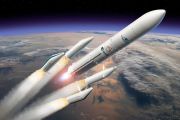
Copernical Team
Is Planetary Defense PI in the Sky?
 In February of 2013, skywatchers around the world turned their attention toward asteroid 2012 DA14, a cosmic rock about 150 feet (50 meters) in diameter that was going to fly closer to Earth than the spacecraft that bring us satellite TV.
Little did they realize as they prepared for the once-in-several-decades event that another bit of celestial debris was hurtling toward Earth, with a mor
In February of 2013, skywatchers around the world turned their attention toward asteroid 2012 DA14, a cosmic rock about 150 feet (50 meters) in diameter that was going to fly closer to Earth than the spacecraft that bring us satellite TV.
Little did they realize as they prepared for the once-in-several-decades event that another bit of celestial debris was hurtling toward Earth, with a mor Late-time small-body disruptions can protect the Earth
 If an asteroid is determined to be on an Earth-impacting trajectory, scientists typically want to stage a deflection, where the asteroid is gently nudged by a relatively small change in velocity, while keeping the bulk of the asteroid together.
A kinetic impactor or a standoff nuclear explosion can achieve a deflection. However, if the warning time is too short to stage a successful deflec
If an asteroid is determined to be on an Earth-impacting trajectory, scientists typically want to stage a deflection, where the asteroid is gently nudged by a relatively small change in velocity, while keeping the bulk of the asteroid together.
A kinetic impactor or a standoff nuclear explosion can achieve a deflection. However, if the warning time is too short to stage a successful deflec Study demonstrates Lunar composition mapping capabilities of SwRI-created space instrument
 A new study by a recent graduate of Southwest Research Institute's joint graduate program in physics with The University of Texas at San Antonio demonstrates the ability of the Lyman-Alpha Mapping Project (LAMP) to determine the composition of areas on the lunar surface by measuring the reflectance of far-ultraviolet (far-UV) light.
LAMP is an SwRI-created, far-UV spectrograph instrument a
A new study by a recent graduate of Southwest Research Institute's joint graduate program in physics with The University of Texas at San Antonio demonstrates the ability of the Lyman-Alpha Mapping Project (LAMP) to determine the composition of areas on the lunar surface by measuring the reflectance of far-ultraviolet (far-UV) light.
LAMP is an SwRI-created, far-UV spectrograph instrument a NASA launches Lucy probe to explore Jupiter asteroids
 NASA launched a spacecraft called Lucy on a 12-year mission to explore Jupiter's Trojan asteroids for the first time on Saturday, gathering new insights into the solar system's formation.
The Atlas V rocket responsible for propelling the probe took off at 5:34 am local time (0934 GMT) from Cape Canaveral.
Named after an ancient fossil of a pre-human ancestor, Lucy will become the first s
NASA launched a spacecraft called Lucy on a 12-year mission to explore Jupiter's Trojan asteroids for the first time on Saturday, gathering new insights into the solar system's formation.
The Atlas V rocket responsible for propelling the probe took off at 5:34 am local time (0934 GMT) from Cape Canaveral.
Named after an ancient fossil of a pre-human ancestor, Lucy will become the first s Dwarf planet Vesta a window to the early solar system
 The dwarf planet Vesta is helping scientists better understand the earliest era in the formation of our solar system. Two recent papers involving scientists from the University of California, Davis, use data from meteorites derived from Vesta to resolve the "missing mantle problem" and push back our knowledge of the solar system to just a couple of million years after it began to form. The paper
The dwarf planet Vesta is helping scientists better understand the earliest era in the formation of our solar system. Two recent papers involving scientists from the University of California, Davis, use data from meteorites derived from Vesta to resolve the "missing mantle problem" and push back our knowledge of the solar system to just a couple of million years after it began to form. The paper Using the Moon to address digital inequality
 Most Americans take access to reliable, fast wireless internet (Wi-Fi) for granted. Yet, in underserved communities, reliable internet access can be as elusive as it is on the Moon. NASA is working to solve both challenges.
Digital inequality or inadequate internet access is a socioeconomic concern across the United States, and the pandemic has worsened the divide. In Cleveland, home of NA
Most Americans take access to reliable, fast wireless internet (Wi-Fi) for granted. Yet, in underserved communities, reliable internet access can be as elusive as it is on the Moon. NASA is working to solve both challenges.
Digital inequality or inadequate internet access is a socioeconomic concern across the United States, and the pandemic has worsened the divide. In Cleveland, home of NA Research to boost astronaut health for future space missions
 New research backed by the UK Space Agency will look to solve challenges such as muscle loss and isolation stress that astronauts face during long missions
The research, which uses the low gravity (microgravity) environment of the International Space Station and other facilities that provide similar conditions to space, could also potentially benefit people who suffer from conditions such
New research backed by the UK Space Agency will look to solve challenges such as muscle loss and isolation stress that astronauts face during long missions
The research, which uses the low gravity (microgravity) environment of the International Space Station and other facilities that provide similar conditions to space, could also potentially benefit people who suffer from conditions such AAC Clyde Space to supply core avionics to Arctic weather satellite
 AAC Clyde Space, a leading New space company, has been selected by OHB Sweden to deliver core avionics worth approx. 797 kEUR (approx. 8.2 MSEK) to ESA's Arctic Weather Satellite. The order has been preceded by a tightening of the original requirements of the systems.
OHB Sweden is the mission prime contractor for the Arctic Weather Satellite, providing the satellite platform and system in
AAC Clyde Space, a leading New space company, has been selected by OHB Sweden to deliver core avionics worth approx. 797 kEUR (approx. 8.2 MSEK) to ESA's Arctic Weather Satellite. The order has been preceded by a tightening of the original requirements of the systems.
OHB Sweden is the mission prime contractor for the Arctic Weather Satellite, providing the satellite platform and system in New US military branch gets its own intelligence wing
 The wing itself is an interim organisation, which will eventually be transformed into the National Space Intelligence Center, taking over part of the activities which at present are carried out by the National Air and Space Intelligence Center.
US Space Force has established its own intelligence group, called Space Force Intelligence Activity (SFIA), which will be based at the Wright-Patte
The wing itself is an interim organisation, which will eventually be transformed into the National Space Intelligence Center, taking over part of the activities which at present are carried out by the National Air and Space Intelligence Center.
US Space Force has established its own intelligence group, called Space Force Intelligence Activity (SFIA), which will be based at the Wright-Patte China's space station worth ever Yuan
 The three Chinese astronauts who are now on board Tianhe, the core module of Tiangong space station, will work and live there for about six months. This is the longest mission so far for Chinese astronauts.
The progress of China's manned space endeavors is evident. Eighteen years after sending its first astronaut into space, the country is building its own space station as a platform for h
The three Chinese astronauts who are now on board Tianhe, the core module of Tiangong space station, will work and live there for about six months. This is the longest mission so far for Chinese astronauts.
The progress of China's manned space endeavors is evident. Eighteen years after sending its first astronaut into space, the country is building its own space station as a platform for h 































